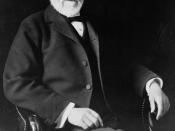Many have debated that the industrial leaders following the 19th Century were "Robber Barron's". However, in this very competitive time period, many new businesses were being formed. It took talented businessmen such as Vanderbilt, Carnegie, and Rockefeller to get ahead and keep the companies running, building America into what it is today, the most powerful nation in the world.
Cornelius Vanderbilt (1794-1877) was a classic Market Entrepreneur, succeeding by creating and marketing a superior product at a low cost. He was a key figure in breaking the steamboat monopoly in the waters around New York City; in the transatlantic steamship business; in the east coast to west coast steamship business; and the builder of the New York Central system, which, in effect, replaced the Erie Canal. Vanderbilt set the example for future "Industrial Statesman" by hard work and dedication; being fiercely competitive, willing to cut prices to get business; reliability, meaning repeat customers; the ability to master the details of a new business and to act boldly when necessary.
When he died he was the richest man in America ($105m) and he left a high quality quadrupled track railroad that played a key role in the development of the Midwestern United States.
In 1873, Andrew Carnegie (1835-1919) became convinced that the future of industry was in the manufacture and use of steel. Concentrating on steel production, he began his acquisition of firms, which were later consolidated into the Carnegie Steel Company. His success was due in part to efficient business methods, to his able lieutenants, and to close alliances with railroads. By 1900, the Carnegie Steel Company controlled iron mines, coke ovens, ore ships, and railroads. It was these circumstances that the U.S. Steel Corp. was formed to buy Carnegie out. In 1901 he transferred possession for $500 million,



Industrial Statesmen?
It was a pleasure to read your informative essay in which you address the question as to whether three pioneering American businessmen may be best described as robber barons or industrial statesmen. Men like Cornelius Vanderbilt, Andrew Carnegie, and John D. Rockefeller were certainly tenacious competitors in the business world and made their share of enemies. But you are correct in observing that they also made notable contributions to our economy. Some might disagree with your conclusions. A number of people believe that whether Vanderbilt, Carnegie, and Rockefeller were industrial innovators or robber barons cannot be definitively answered. Perhaps they were a little of both. At any rate, your report was concise and highly readable. A bibliography would have nicely supported your use of facts and details in providing brief biographies of Vanderbilt, Carnegie, and Rockefeller. Good effort!
7 out of 7 people found this comment useful.